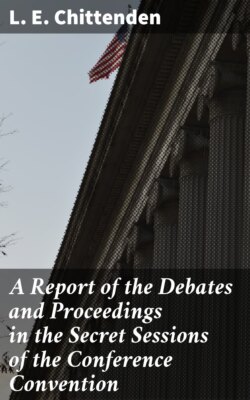Читать книгу A Report of the Debates and Proceedings in the Secret Sessions of the Conference Convention - L. E. Chittenden - Страница 22
На сайте Литреса книга снята с продажи.
MR. WICKLIFFE'S PREAMBLE AND RESOLUTION.
ОглавлениеWhereas, the second section of the fourth article of the Constitution of the United States declares, "that no person held to service or labor in one State, under the laws thereof, escaping into another, shall in consequence of any law or regulation therein, be discharged from such service or labor, but shall be delivered up on claim of the party to whom such service or labor may be due."
This clause is one of the compromises without which no Constitution would have been adopted. It was a guarantee to the States in which such labor and service existed by law, that their rights should be respected and regarded by all the States; and it is not within the competency of any State to disregard the obligation it imposes, or to render it valueless by legislative enactments. And whereas, the House of Representatives of the United States did, on the—— day of February, by unanimous vote, declare that neither the Congress of the United States nor the people or government of any non-slaveholding State, has the constitutional right to legislate upon, or to interfere with slavery in any slaveholding State in the Union.
This declaration is regarded by this Convention as an admission that the statutes of those States, passed for the purpose of defeating the provision of the Constitution aforesaid, and the laws of Congress made to enforce the just and proper execution of this constitutional guarantee, are in violation of the supreme law of the land.
The provisions of the statutes in many of the non-slaveholding States, commonly known and called "personal liberty bills," amount in their consequences to a practical nullification of the acts of Congress of February 12th, 1793, and September 18th, 1850, and are in violation of the second section of the fourth article of the Constitution, as before stated. That the spirit of those statutes appears to be repugnant to the principles of compromise and mutual and liberal concessions which dictated the section of the Constitution in question, and which pervades every part of that instrument. It is, therefore, respectfully requested by this Convention that the several States abrogate all such obnoxious enactments.
That the spirit of comity between the States, and the spirit of unity and fraternity which should actuate all the people of these United States, require that complete right and security of transit with all persons who owe them service or labor should be allowed to the citizens of each State by the laws of every other State.
Resolved, That a copy of the foregoing be sent by the President of this Convention to the Governors of each of the free States, as the deliberate judgment and opinion of this Convention, and that he request the same be laid before their respective Legislatures.
Mr. CHASE:—I move that all the resolutions, of the States, under which Commissioners have been appointed, or relating to subjects to come before this Conference, be printed. I think this course convenient and necessary, and one reason that I may assign is this: The opinion of the Legislature of the State of Ohio, as expressed in one of the resolutions adopted by that body, is, that it would have been wiser and better if the time for holding this Conference had been deferred until a later period. Ohio has expressly said in her resolutions that she is not prepared to assent to the terms of settlement proposed by Virginia, and has expressed the opinion that the Constitution as it now stands, if fairly interpreted and obeyed, contains ample provision for the correction of all the evils which are claimed to exist. Nevertheless she is willing to meet in a friendly spirit and consult with her sister States. But the opinion extensively prevails that this Conference ought not to have been called upon so short a notice and before the inauguration of the incoming administration. We, the Commissioners from that State, are instructed in the resolutions, to which I have referred, to use our influence to procure an adjournment of this Conference, before final action is taken, to the 4th of April next. I shall feel it my duty, at some future time, to make a motion to that effect. The extent to which I shall urge its adoption will depend in some measure upon the course of events and the opinions of my colleagues. In the mean time I wish to see all the resolutions printed.
The motion of Mr. Chase was agreed to. The resolutions as printed will be found in the appendix.
Mr. ALLEN, of Massachusetts:—Before the adjournment to-day I desire to know what will be the order of business when these various reports come up for discussion. By the general rules governing parliamentary proceedings, to which I suppose we are subject, I understand the first question will be upon the substitution of the minority report presented by the gentleman from Connecticut (Mr. Baldwin) for the report of the majority; and that, upon that question, amendments may be offered, and either accepted or rejected, both to the reports of the majority and the minority. I think it would be well to have this matter understood. Am I right in this?
The PRESIDENT:—The Chair understands that the gentleman from Massachusetts has correctly pointed out the manner of proceeding.
On motion of Mr. Hackleman, the Conference then adjourned until 12 o'clock to-morrow.
